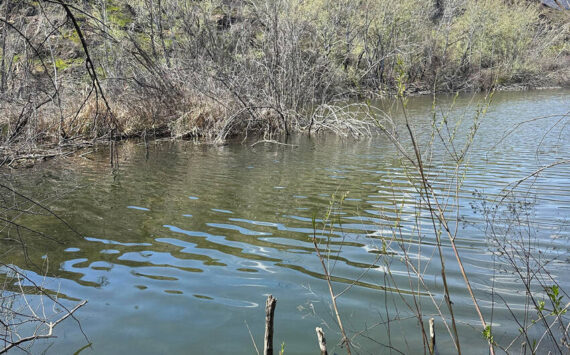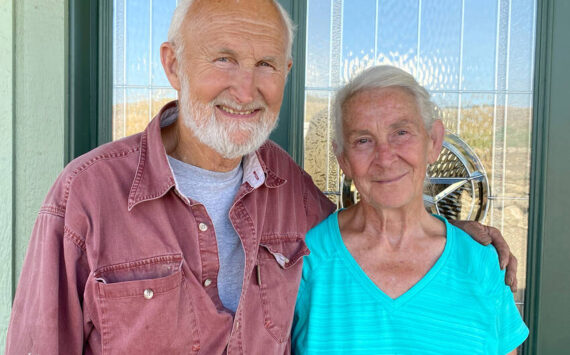OROVILLE – Joseph Enzensperger approached the Oroville City Council to ask that they consider opposing Okanogan County PUD’s current plan to generate hydroelectric power at Enloe Dam because of the high cost and potential to dewater the Similkameen Falls below.
Enzensperger asked the council at their Tuesday, Feb. 7 to first study the public utility’s plan and a new study “Review of the Economics of Restoring Hydropower at Enloe Dam on the Similkameen River ” by Rocky Mountain Econometrics. The analysis, released in late January and commissioned by the Columbia River Biological Education Project and several conservation groups, claims the project would cost ratepayers more than it would return, as well as ruin the aesthetic and economic value of the falls. The analysis claims the PUD will lose $26 for every megawatt produced at the dam.
“(This is) a very thorough assessment of the PUD’s plans for Enloe Falls,” said Enzensperger, adding the Federal Energy Regulatory Commission (FERC) has turned down three previous attempts to relicense the dam, built in the early 1900s.
“At current electrical prices it is actually a losing proposition. What we’ve seen is energy prices really reached their high point in 2008 and have since fallen off because of the economy.
“Another factor is wind power has come on line. In Texas wind power generation is now enough to replace 10 nuclear plants. In Germany solar power has replaced the need for seven nuclear plants.”
Enzensperger claims the utility is willing to take a loss on the project just to see it done.
“What we lose in all this is the scenic value of the falls, especially to the Similkameen Trail. These are huge attractions that draw people to town. The trail is in the middle of the Pacific Northwest Scenic Trail which includes seven national parks and seven National Forests and goes all the way to Glacier. This trail is our opportunity.”
Enzensperger said Native American tribes have always wanted fish passage at Enloe. He said that could result in fish habitat for 50,000 King Chinook salmon and 100,000 steelhead above the dam.
“This is an opportunity to turn an empty main street around with outfitters, guides and bed and breakfasts. A park where the PUD wants to put a powerhouse would make a wonderful resting place,” said Enzensperger.
“The PUD is out of control… it’s a huge gamble. The BLM stands ready to take down the dam, they consider it a liability. I’d like to see a resolution come from this council when they’ve had time to digest this study.”
Councilman Walt Hart thanked Enzensperger for his presentation.
“It was a good presentation, I will admit I was very negative about the concept before you started to change my mind,” Hart said.
Mayor Chuck Spieth asked Arnie Marchand, a member of the Colville Confederated Tribes, if he had any comments.
“I could rebut everything he has said. I’ve been at this thing for 12 years when the Tribe signed off after it was proven that fish were never above the dam. If you would like me to talk about this at length sometime I would be willing to do so at a future date,” said Marchand, adding that local Canadian Indian Bands have indicated they do not want fish passage at Enloe, where fish have historically been blocked by the natural falls below the dam.
Under old business, the city council is considering adopting fees for standbys of the ambulance and crews at special events like the upcoming Northwest Ice Fishing Festival at Molson, May Festival Three on Three Basketball Tournament and the Chesaw Fourth of July Rodeo.
Organizations in the past gave donations. The economy is tight and now that we’ve stopped getting donations we’ve stopped get volunteers for the ambulance crews at these events,” said Debra Donoghue, Oroville Ambulance Coordinator.
“A rough estimate of the cost for three people for nine hours is $200, plus milage and administrative fees,” said City Clerk Kathy Jones. “If the council agrees we need to set up a charge by resolution.”
Councilman Hart said he’d like to make a distinction between public events and private events, as well as between events that take place in town and those that are out of town.
“If it is a business for them they should have to pay the costs,” agreed Mayor Spieth.
The council will consider a smaller fee for public events versus private events and will address passage of a resolution at a future meeting.
The council is still studying the issue of cooperative marijuana grows and marijuana dispensaries within the city limits. A moratorium on allowing these uses was passed at the previous council meeting and will be readdressed in a public hearing in six months.





